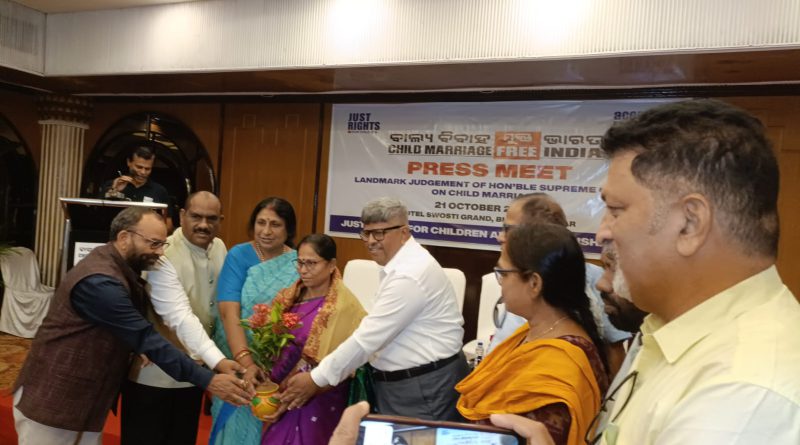Supreme Court Issues Guidelines on Child Marriage, Puts Focus & Onus on Panchayats, Schools, Communities
Supreme Court issues Guidelines to various ministries for complete elimination of child marriage
•Makes Panchayats, School principals, communities, police and Child Marriage Protection Officers accountable for Child Marriages
•Child Marriage Free India Partner and Odisha-based Petitioner Society for Enlightenment and Voluntary Action (SEVA) expresses gratitude, says over 200+ NGOs working as part of the CMFI on similar model
•CMFI, a coalition of over 200 NGOs, has stopped more than 1,20,000 child marriages in 2023-24 alone across India
Bhubaneswar ( KCN)
Hearing a petition filed by Child Marriage Free India (CMFI) coalition partners Society for Enlightenment and Voluntary Action (SEVA) and activist Nirmal Gorana, the Supreme Court of India has passed a landmark judgment and issued guidelines that focusses on mobilizing village communities to end child marriage. Asserting that the guidelines issued by the apex court will definitely lead to the end of child marriage by 2030, Odisha-based NGO SEVA Director Alaka Sahu at a press conference said that the guidelines perfectly echo the work and beliefs of the CMFI campaign and gives a new lease of energy to the entire 200+ NGO partners of the coalition.
Notably while the Apex Court has directed that “Child Marriage Free Village” initiative should be launched in the country, the coalition has created over 50,000 ‘child marriage free villages’ across India in 2023-24 alone.
The press conference was also addressed by Hon’ble Member OSCPCR, Sasmita Nanda and CMFI convenor Ravi Kant.
Charting a slew of guidelines that focus on empowering children about their rights, sex education, making panchayats, school authorities and Child Marriage Protection Officers accountable for any child marriage being solemnized in their vicinity, the Apex court has also directed that prevention, protection and prosecution model should be used to implement the Prohibition of Child Marriage Act (PCMA) 2006. The court has also said that the approach should be community-driven and prosecution should be used as the last resort in preventing child marriage.
Expressing deep gratitude to the Supreme Court for its newly issued guidelines aimed at eradicating child marriage in India by 2030, Alaka Sahu said, “We are immensely grateful to the Supreme Court for these guidelines, which will ensure that India will reach the tipping point and become child marriage-free by 2030.” She asserted that with these new guidelines extended to state governments and village authorities, the impact will be multi-fold and significantly stronger for ending child marriage.
All the NGO partners, as part of the CMFI campaign, follow PICKET strategy in over 400 districts in the country. PICKET strategy has been espoused by Bhuwan Ribhu who is the founder of Child Marriage Free India campaign. Besides the NGO partners, the strategy has also been endorsed by various government agencies. PICKET stands for Policy, Institution, Collaboration, Knowledge, Ecosystem, and Technology and it is with the implementation of this holistic approach that in the past year, the Child Marriage Free India (CMFI) campaign and its partner NGOs have successfully prevented over 120,000 child marriages. Additionally, government efforts have protected more than 11 lakh vulnerable children from being married off.
Talking about how the new guidelines will accelerate the country’s journey towards becoming child marriage free, CMFI Convenor, Ravi Kant said, “Child marriage is a pressing global issue, and India is taking a leading role in combating this grave crime against children through its policies and judicial decisions. It also gives us immense pleasure to share that many of the guidelines i…

